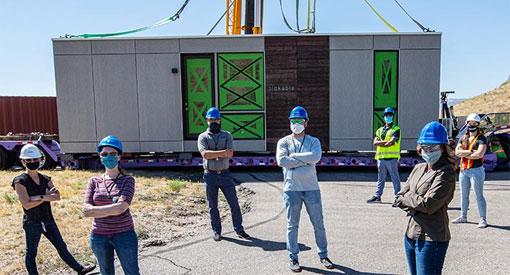Buildings Research
NREL is transforming energy through the integration of building science and innovation to strengthen the resiliency, efficiency, and affordability of energy systems around the world.
Major research, development, demonstration, and deployment capabilities for buildings research at NREL include the key areas below. In addition, we support NREL's critical objective related to the circular economy for building materials by identifying solutions that minimize waste from building construction.
Building Energy Modeling
NREL leads the development of physics-based modeling and simulation software tools to predict and analyze building system-level effects and performance.
Communities and Urban Districts
Our communities and urban science research, development, demonstration, and deployment focuses on ensuring communities are sustainable, equitable, affordable, and resilient.
Extreme Climates
Through NREL's Alaska Campus in Fairbanks, NREL advances building technologies for extreme environments and pushes the limits of renewable energy, ensuring the clean energy transition leaves no one behind.
Industrialized Construction
NREL leverages the benefits of industrialized construction—higher-quality buildings, faster construction timelines, improved productivity, increased technology integration, and labor cost savings—to enable cost-effective strategies for energy efficiency, integrated grid-interactive controls, and renewables in retrofit and new construction projects.
Lighting
NREL leverages its long-standing expertise in the basic science of semiconductors and materials development for photovoltaics to explore new emitter materials for solid-state lighting.
Resilient Buildings
Through NREL's Alaska Campus in Fairbanks, NREL partners with local communities and tribes to co-create sustainable, resilient buildings that thrive in the local environment, whether it's the Arctic tundra or the tropics.
Sensors and Controls
NREL leverages machine learning, advanced data analytics, and physics-based modeling and simulation to optimize building design and operations.
Systems Technologies
NREL buildings research supports optimized building system design.
Thermal Energy Storage
NREL is significantly advancing the viability of thermal energy storage as a building decarbonization resource for a highly renewable energy future.
Windows
Windows are responsible for about 10% of energy use in buildings and influence end uses that compose 40% of building energy use.
Workforce Development
For building science and innovations to have industry impact, research results and knowledge must be accessible and easy to use for stakeholders.
NREL's buildings research areas focus on building energy science, commercial, and residential opportunities.
Share




